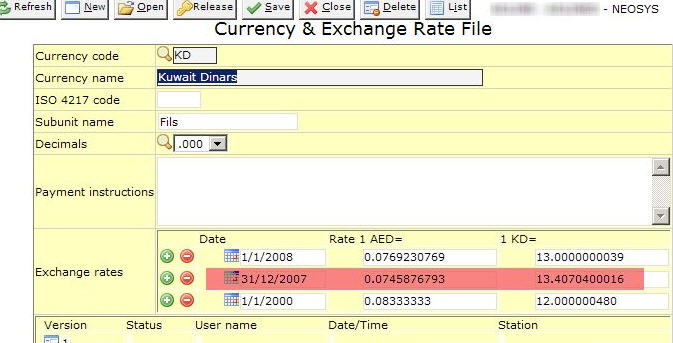Revaluing closing balances: Difference between revisions
No edit summary |
m 3 revisions |
(No difference)
| |
Revision as of 21:26, 31 July 2008
New Rules
According to the above screen shot the rate dated 31/12/2007 will be used for:
- normal transactions dated exactly 31/12/2007 and no later
- NEOSYS automatic revaluation procedure for period 12/2007
Transactions dated up to 30/12/2007 will use the rate effective from 1/1/2000.
Transaction dated from 1/1/2008 onwards will use the rate effective on the 1/1/2008.
All the above is fairly obvious, however, if there was no exchange rate on the 31/12/2007 then when you use the NEOSYS revaluation program to automatically revalue the closing balances of 2007 (as at 31/12/2007) NEOSYS would use the rate of the following day, in other words that of 1/1/2008.
This perhaps surprising procedure has the following logic:
- The currency file rates are considered to be effective from the START of the day in question
- Revaluation is logically at the END of the day
- The rate at the END of the day is logically the rate at the START of the following day
Old Rules
This applies to versions of NEOSYS dated prior to 20/4/2007.
According to the above screen shot the rate dated 31/12/2007 will be used only for normal transactions dated exactly 31/12/2007.
Transactions dated up to 30/12/2007 will use the rate effective from 1/1/2000.
Transaction dated from 1/1/2008 onwards will use the rate effective on the 1/1/2008.
All the above is fairly obvious, however, when you use the NEOSYS revaluation program to automatically revalue the closing balances of 2007 (as at 31/12/2007) NEOSYS will use the rate of the following day, in other words that of 1/1/2008.
This perhaps surprising procedure is actually logical because:
- The currency file rates are considered to be effective from the START of the day in question
- Revaluation is logically at the END of the day
- The rate at the END of the day is logically the rate at the START of the following day
